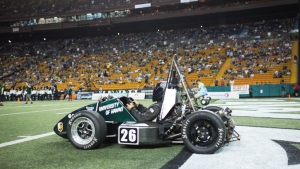The Rainbow Warriors Racing (RWR) team received a major boost from Toyota Hawaii, a subsidiary of Servco Pacific Inc., with a 5-year, $60,000 pledge to help design, analyze, manufacture and test a fully-electric race car with the hopes of competing in the Formula Society of Automotive Engineers (FSAE) Electric Competition in 2021 and beyond.
The team—which is housed in the University of Hawaiʻi at Mānoa College of Engineering—will receive $20,000 in funding the first year and $10,000 per year for the next four years. In addition, Toyota Hawaii is donating parts and equipment, and providing mentorship and technical training.
More about RWR
 FSAE is an international collegiate competition where students from universities around the world work in teams to design, analyze, build, test and compete with a formula-style race car.
FSAE is an international collegiate competition where students from universities around the world work in teams to design, analyze, build, test and compete with a formula-style race car.
RWR was revived in 2010 by mechanical engineering department Professor Mehrdad Nejhad and a group of senior mechanical engineering students who took on the challenge of building a traditional formula-style race car as part of their capstone design project. Under the mentorship of Associate Professor A. Zachary Trimble, the team pivoted toward modern energy needs and trends to compete in the all-electric competition during the 2019–20 academic year.
The current team, supervised by Nejhad, welcomes students from all disciplines and class standing, offering them the chance to shadow more experienced students and work on a rewarding multidisciplinary project. Students apply classroom knowledge to real-life scenarios as they model, design, analyze and fabricate an FSAE electric race car, affording them an invaluable chance to acquire new skills, knowledge and abilities.
“Toyota Hawaii’s technical and financial support, as well as training, is critical to the success of such real-life, multidisciplinary, complex and large-scale projects, and we are truly grateful to Toyota Hawaii for providing our students with such invaluable support,” said Nejhad.
Challenges
The 2020–21 academic year brought new challenges as the team continues on its quest to build and compete with its first fully-electric vehicle while adjusting to COVID-19 social distancing requirements.
In fall 2020, students are working remotely on the software design, analytical and computational analyses, modeling and rapid prototyping, and other planning elements of the project, with the hope that they will be able to come together in the spring for the labor-intensive production phase.
Toyota Hawaii’s support
The RWR team now has additional financial support to purchase costly components and cover additional expenses associated with fabricating an electric race car, providing the team with the economic stability it needs to achieve long-term success.
“Rainbow Warrior Racing is eternally grateful for the long-term sponsorship from Toyota Hawaii and their gracious commitment to help fund our multidisciplinary team,” according to a statement from Team RWR. “The relationship between RWR and Toyota Hawaii is critical to the development of an educational platform that allows our engineering students the opportunity to nurture skills that will later be used in their professional careers. RWR could not do what we do if it were not for the help from our amazing sponsors like Toyota Hawaii. Mahalo and thank you for the continued support.”
The partnership is a natural fit for Toyota Hawaii, a leader in Hawaiʻi’s automotive industry with a history of giving back to the community and being a strong advocate of educational opportunities.
“Designing, analyzing and manufacturing a fully-electric race car is no easy task, and Toyota Hawaii is proud to support the Rainbow Warrior Racing team’s innovative spirit,” said Peter Dames, executive vice president of Servco Pacific Inc. on behalf of Toyota Hawaii. “We’re excited to see the final product. We hope these students will continue to develop the valuable mechanical engineering and technical training skills they have learned from this project to make a positive impact in their careers here in Hawaiʻi.”


